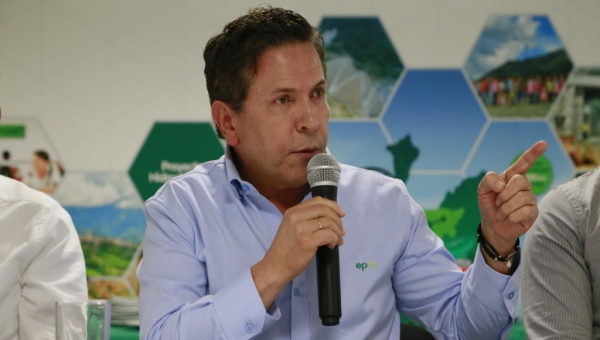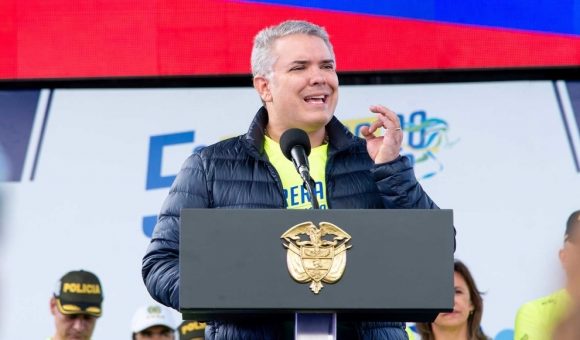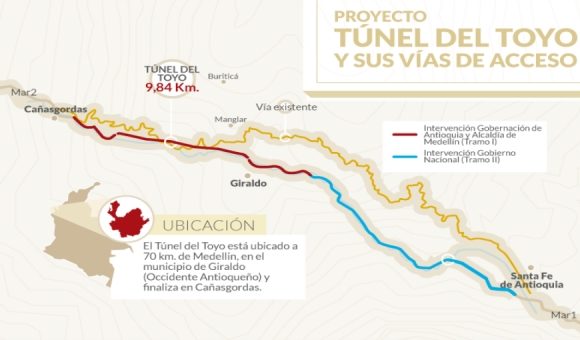Medellin Mayor Fires EPM General Manager with No Explanation Why

In what critics see as a disturbing habit of recklessness and political capriciousness, Medellin Mayor Daniel Quintero and his hand-picked Board of Directors of city-owned public utility EPM on February 1 fired EPM general manager Álvaro Guillermo Rendón.
Rendón — himself hand-picked by Quintero to take over as EPM general manager in January 2020 upon Quintero’s election as Medellin Mayor – is just the latest victim of growing turmoil inside EPM, as EPM unions and civic groups slam Quintero’s capriciousness and his appointments of political hacks rather than technocrats in several key executive positions.
Quintero, with a circus-empresario political flair — accompanied by his now-departed, sedate alter-ego Rendón, a lawyer with no engineering experience in a company that is overwhelmingly engineering-driven — last August had made what critics say could turn out to be a catastrophic decision to sue EPM’s construction contractors at the US$5 billion Hidroituango hydroelectric project, as well as propose a mind-boggling, quixotic series of changes to EPM’s business model.
Those moves — taken without consulting EPM’s prior Board of Directors — triggered an unprecedented mass resignation of the entire Board last August.
Then, two days ago (on January 31), Rendón publicly released a letter asking EPM’s board to consider Quintero’s previously secret demand for his resignation, only days after Quintero had falsely denied publicly that Rendon must resign.
But as of this morning (February 2) neither Quintero nor the EPM Board have given any public explanation for the firing — or explain what is really happening inside EPM – in defiance of EPM’s mandatory, legal requirement for transparent corporate governance.
Meanwhile, in a February 2 interview with Colombia’s Blu Radio network, Rendon revealed that his clash with Quintero arose because Quintero has been pressuring Rendón to appoint political hacks to key management positions.
“The mayor, on January 14 [2021], asked me to resign, a decision that I found a bit intriguing,” Rendon stated in the Blu Radio interview. “Mayor Quintero told me: ‘I want a person to copy me more.’ I think the mayor still assumes that EPM is his personal dispatch secretary,” he added.
Proantioquia Slams Manipulations
Medellin’s leading civic group Proantioquia on February 1 publicly slammed the Mayor’s manipulations, “just as we did on August 12, 2020, after the massive resignation of the Board of Directors.”
“It is an obligation to respect the administrative independence of the company as defined by the principles of good corporate governance and the framework agreement of relations between the municipality of Medellín and EPM, in force since 2007,” Proantioquia noted in a press statement.
“In just one year of the current administration, EPM has been immersed in various crises. First, the request to change the corporate purpose of EPM that alerted the international risk-rating agencies and over which there was no political control prior, nor a participatory public conversation.
“Then, the full resignation of the Board of Directors for the decisions that were not consulted on the change of the social object of the company, and the lawsuit filed against the builders and auditors of Hidroituango.
“Third, the inappropriate way of handling matters related to the constitution of the new Board of Directors, ignoring what is required by corporate governance to guarantee transparency, rigor and plural participation in the formation of the company. And more recently, the departure of the General Manager appointed by the Mayor after just one year, his trusted interlocutor and whom he supported only 10 days ago in the media via a communication to all citizens.
“We emphatically reiterate that EPM’s administration requires technical, legal and financial rigor. Therefore, we demand that the Mayor of Medellín and the Board of Directors — assuming the statutes of the company and the rules of corporate governance — make decisions based on the institutional stability of the company, guaranteeing the provision of public services and transparency before the community and its groups of interest.
“Finally, we summon the citizens, the Medellín City Council and the national and territorial control entities to activate their social and legal mechanisms for EPM’s protection. The welfare of our city, and the energy stability of the country, are linked to the sustainability of EPM,” Proantioquia concluded.
Medellin Chamber of Commerce Rips Political Schemes
Meanwhile, Medellin Chamber of Commerce executive president Lina Vélez on January 31 issued a public statement slamming Mayor Quintero’s bizarre behavior in directing EPM.
“It is incomprehensible that, for a young mayor who by his own academic merits achieved a specialization in finance at the University of the Andes and a Master’s degree in business administration from the University of Boston, does not want to understand and abide by governance statutes for public administration that are written in basic Spanish,” Vélez said.
“For the sustainability of the company and for the confidence of the international and national financial markets [upon which EPM’s financing depends] it is essential that another crisis does not repeat itself.
“[Mayor Quintero and the EPM Board] have the obligation to publicly explain why, for the first time in EPM’s recent history, a manager lasts barely a year. The responsibility of directing Grupo EPM, made up of 47 multinational companies with an equity of more than COP$22 trillion (US$6.15 billion) . . . is in the hands of its Board of Directors and common sense.
“If the current framework agreement governing relations between the municipality of Medellín and EPM is not the most appropriate, then from the Chamber of Commerce of Medellín for Antioquia we call upon the City Council to prioritize its debates and establish a scheme of mandatory compliance with the model of corporate governance for EPM.
“I also urgently await the IDB’s [International Development Bank] intervention in this [corporate governance] model,” she added.
















